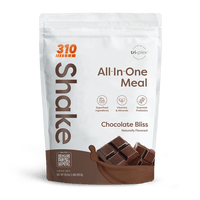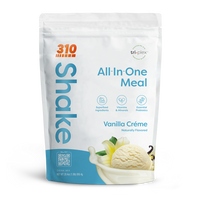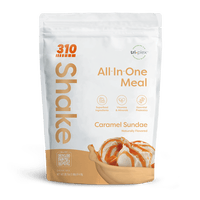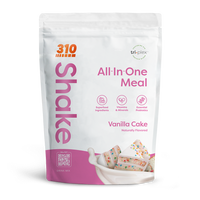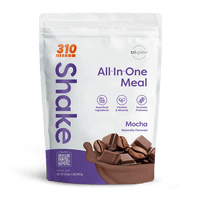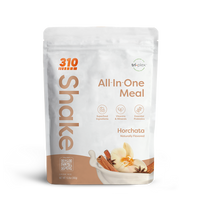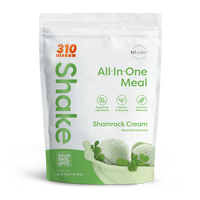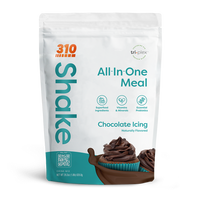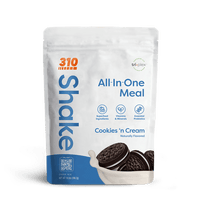In a recent survey we put out in the 310 Community, many of you mentioned that for you, switching to a healthier diet meant dealing with a bit more… gas each day.
Though gas is not something people frequently talk about, being “bloated” is something that as a society we talk about fairly often, and the two are connected!
But while releasing gas is a completely normal process linked with our digestive processes, when do things go from normal to not-so-normal when it comes to what you’re experiencing? Is there anything you can do or change to get in a more comfortable position with your gas and bloating?
Read on for the answers to your pressing (often not talked about) questions regarding the two!
What Actually IS Gas and Where Does it Come From?

When it comes to gas, we’re talking about excess air trapped in the intestinal tract that the body needs to expel (out one end or the other)! (1)
But the gas comes from two different places:
1) From Outside the Body
Whenever you’re eating or drinking something, you have the potential to swallow air along with it. Being aware of this can help you take in a lot less air during meal and drink times.
The gas that occurs from this process of taking in air is made of carbon dioxide, oxygen, nitrogen and hydrogen – and is typically odorless and undetectable.
2) From Inside the Body
A different kind of gas is produced due to processes within your body. This happens during digestion, particularly due to certain foods that you eat. The small intestine does not have the enzymes it needs to digest carbohydrates. This food instead passes into the large intestine, where bacteria helps break down the food, which produces a gas. (2,3)
This type of gas, made of hydrogen and methane often has an odor caused by the partial or complete breakdown of indigestible fibers in the large intestine, a process called fermentation. (4)
What Gas is Healthy and What Isn’t?

First, let’s start by saying that gas is completely normal and something that you cannot avoid! It happens to everyone, everyday!
In fact, the average person passes gas up to 21 times per day. (5)
Understanding the difference in the type of gas your body produces can also help you pinpoint changes in your diet that need to be made, or lifestyle changes that may need an adjustment (like eating too fast or multi-tasking while you’re eating).
But, knowing that gas is healthy also means knowing when it isn’t healthy and when there may be a problem.
Dealing with excessive gas (passing gas more than 25 time per day), or especially stinky circumstances, could mean that you need a dietary change, because something isn’t agreeing with your body.
Before we address ways in which you can get your gas under control while still eating a healthy diet, let’s also take a look at bloating, which is closely connected.
What IS Bloating?
If I asked you how many times you’ve used the phrase, “Ugh, I feel SO bloated!”, you would probably say quite a lot – but do you actually know what bloating is caused by? The answer is too much gas!
When your gastrointestinal (GI) tract is filled with air (or gas), it brings a “stuffed” feeling and appearance otherwise known as bloat. (6)
Bloat is not only aesthetically disliked, but it can also be very uncomfortable and even painful.
The best way to avoid bloat is simply to put practices into place that help you control your gassiness, and find gas and bloating relief. Let’s talk about them next!
Healthy Habits to Reduce Excess Gas and Bloating
Even though as we mentioned, daily gas is normal, excessive gas and the feeling of being bloated is not desirable or necessary.
To keep gas at healthy levels within the body, check out these must-know and must-use TIPS:
-
Regulate Gas-Producing Foods
The first thing you can do to avoid excess gas is to make sure you don’t eat too much of certain foods that are especially gas-producing. In fact, some food COMBOS will literally blow you away, and we’ll go into that too! (7, 8)
Which foods cause gas and bloating? Let’s find out!
Top Gas-Producing Foods & Drinks:
- Beans
- Peas & Lentils
- Cruciferous Veggies (Broccoli, Cauliflower, Cabbage, Brussel Sprouts)
- Garlic & Onion
- High-fructose Fruits (Apples, Pears, Peaches, Plums)
- Soda and Other Sparkling Drinks
- Milk & Dairy Products (if you’re lactose intolerant)
- Wheat, Rye, Barley, Oats
- Starchy Foods (Potatoes, Pasta, Rice)
- Especially Fatty Foods
- Sugar Alcohols
- Chewing Gum (due to air you swallow)
Notice anything about this list?! There are QUITE a lot of things on it. Which is why we want to stress that the goal is not to REMOVE the healthy things on the list above, it’s to REGULATE them.
Before we go into what that should look like for you, let’s look at some particularly gassy combos, and rules for keeping things under wraps…
Top Gas-Producing Food COMBOS:
Although it may be impossible to regulate certain “food combos” all the time when it comes to helping to prevent gassiness, it is definitely an interesting point to consider when planning your meals. (9, 10)
Here are some “rules” to keep in mind when it comes to food gassiness combos….
-
Leafy Greens & Non-Starchy Veggies Go With Everything! Non-starchy vegetables (celery, broccoli, peppers, etc.) and leafy greens come with their own digestive-helping enzymes to help them go down easy, no matter what other foods they’re paired with.
-
Eat Fruit By Itself: Foods that are rich in protein or starch take a while to digest, while fruit requires almost no digestion. When eaten after a meal, the fruit sitting on top of your undigested food may result in a gassy situation for many hours.
-
Starch Is Best With Starch: There’s a reason many people eat rice and beans together! When you add two starches together (including legumes, potatoes, rice, quinoa and other grains), they both require alkaline digestive juices and therefore digestion moves smoothly.
-
Don’t Eat Double Proteins: Protein on the other hand requires an acidic digestive juice, so is best paired with non-starchy veggies and NOT a starch. Also, eating too much protein all at once can take more time than ideal to digest, which may cause bloating and gas.
You Won’t Believe These Gas-Causing Combos!
Based on the rules above, here are some particularly gassy combos to keep in mind! You’ll likely be surprised at this list...
- Pizza -> (Dairy (Protein) + Starch)
- Cheeseburger -> (Dairy (Protein) + Starch)
- Egg omelet with meat in it -> (Protein + Protein)
- Yogurt with fruit -> (Dairy (Protein) + Fruit)
- Cheese & Bean Burrito -> (Dairy(Protein) + Starch)
-
Get Enough Fiber

Don’t confuse the fact that we mentioned high gas-producing foods with the fact that you still need to get a lot of fiber in your diet in order for it to be healthy!
In fact, eating a low-fiber diet (that includes processed carbs and sugar) can equate to more gas and bloating – since the foods will move faster through the digestive tract than is ideal, causing these issues. In addition, fiber is essential to healthy stools that are easy to pass. (11)
So, a low-fiber diet (though you may THINK leads to less gas), will actually result in more gas, bloating, digestive problems, and pooping problems (like constipation or diarrhea) than before.
Learn more about how fiber helps with healthy digestive and bowel habits in this article on a Healthy Pooping Schedule.
-
Watch Your Air Intake
The next helpful lifestyle tip for reducing the amount of unnecessary gas in your body is to watch out for practices that increase the amount of air you “ingest”. This is probably not something you’ve thought about much but it is absolutely something you do every day… ingest air!
If you remember, we mentioned that one of the types of gas in our bodies (the one that comes out odorless and undetectable) is the kind that comes from us taking in air through our mouths. And this can still cause unnecessary gas in the body so you want to avoid it.
Stop taking in so much air on a daily basis by…
- Making the switch to intentional eating: When you make the commitment to be much more aware of what you are eating (tastes, smells, etc.), which is called mindful eating, you can help move away from some practices that cause people to take in more air while eating.
- Eating too fast, eating while talking, or eating while multi-tasking are all things that cause you to swallow air while eating. This also applies to drinking! Instead, focus on slower, controlled bites and taking the time to really savor the food or drink, not rush through it.
- Ditch the straw when drinking: You probably had no idea, but using a straw in your drinks can also lead to you swallowing excess air that then gets trapped in the digestive tract! When drinking your meal replacement shakes, lemonades, teas, or any other drinks, sip it right from the shaker cup or glass to avoid getting access air. (12)
- Limit chewing gum: Another practice that can cause you to take in more air is the repetitive nature of chewing gum. Doing this causes you to take in more air as you chew. This can also happen when eating hard candies, which we also don’t recommend for the sugar content.
- Stop smoking: You already knew smoking is one of the worst habits out there for you, but now you have another reason to dislike it. When you smoke, you also take in more air that can make gas and bloating worse.
-
Watch Out for Food Allergies
Next on our list is food allergies, because if your stomach is sensitive to certain foods, noticing symptoms such as digestive upset, access gas or pooping problems are one of the best ways to pinpoint that something is wrong.
Many people are unable to digest the lactose (or sugar) in milk and dairy products,making them lactose intolerant. If you get excess gas, bloating, or diarrhea after eating dairy products, than you should substitute with plant-based sources instead. (13)
In addition, there are many different levels to lactose intolerance. You may be someone who can have a small amount of dairy, but if you have too much, you’ll suffer bathroom and digestive problems.
That’s where it’s important to pay attention to your body and any changes based on your diet.
In addition, some people cannot ingest gluten. Though gluten-free is a popular dietary choice that many people use now, for those with celiac disease, it is not an option – they simply cannot have gluten. People who have celiac disease experience bloating, gas, diarrhea, fatigue, nausea,, and other symptoms when they eat gluten (a protein found in all forms of wheat and other grains including barley and rye). (14)
-
Be Careful With Sugar-Free
As you already know, as you continue your journey to cleaner, healthier eating, a good practice is to try to stay away from sugar and choose healthier options. But you also have to be careful about those choices.
When it comes to actual sugar, fructose is a type that you should stay away from as often as possible, as it’s often added to processed foods, and absorbed too quickly into the body, leading to negative health consequences.
It’s also been found that people with a sensitivity or intolerance to fructose may experience uncomfortable symptoms like gas, bloating, and diarrhea. (15)
In addition, sugar alcohols – which are commonly added to sugar-free products – can have the same effect, especially sorbitol.
A much healthier option is to choose foods that include plant-based sweeteners. For instance, 310 Shakes get their yummy sweetness from plant-based Stevia and monk fruit.
-
Cleanse & Hydrate the Body Regularly

Another way to keep gas and bloating under control is to regularly hydrate with drinks that can also help assist with digestion.
310 Tea blends contain ingredients including green tea, oolong tea, ginger, and birch – known to help support energy, metabolism, and the body’s natural digestive and waste removal processes.
In addition, 310 Juice blends contain superfoods and fiber that can help with healthy bowel movements and smooth digestion.
Plus, both of these (and also 310 Lemonades, Shakes, and Hydrates), help keep you hydrated, assisting with constipation prevention and trapped gas.
-
Replenish Digestive Enzymes & Probiotics
Our final tip when it comes to helping to prevent excess gas and bloating is to give your gut and digestive system some much-needed help to feel your best.
Your gut needs probiotics – or good and healthy bacteria – for optimal health, and much of your digestive system and immune system are located in the gut! In this way, it’s easy to see that probiotics are essential to continued good digestive health.
In addition, your body loses enzymes necessary for digesting the foods you eat and absorbing nutrients as you age – so replenishing them with a high-quality targeted Digestive Enzyme supplement is key to getting things running smoothly again.
Ready to put a halt on daily bloating and gassiness by bringing things back to normal levels? We hope this article helped you see where you can make some healthy changes while still eating clean and healthy on the path to your goals!
Have a question or want to see articles on a certain topic? Let us know below! And check out our series of “Real Talk” articles on often undiscussed but important topics, on the 310 Blog.
Sources:
- https://www.wellandgood.com/what-gas-says-about-health/
- https://my.clevelandclinic.org/health/diseases/7314-gas-and-gas-pain
- https://www.mayoclinic.org/diseases-conditions/gas-and-gas-pains/in-depth/gas-and-gas-pains/art-20044739
- https://pubmed.ncbi.nlm.nih.gov/28067588/
- https://my.clevelandclinic.org/health/diseases/7314-gas-and-gas-pain
- https://familydoctor.org/condition/bloating/
- https://health.clevelandclinic.org/foods-that-cause-bloating/
- https://www.tuasaude.com/en/foods-that-cause-flatulence/
- https://mealpreponfleek.com/food-combinations-you-need-to-know/
- https://www.thehealthsite.com/fitness/diet/worst-food-combinations-that-can-cause-bloating-t0817-512524/
- https://www.livestrong.com/article/300356-gas-bloating-low-carb-diet/
- https://www.healthline.com/health/drinking-through-a-straw#drawbacks-and-side-effects
- https://www.mayoclinic.org/diseases-conditions/lactose-intolerance/symptoms-causes/syc-20374232
- https://www.niddk.nih.gov/health-information/digestive-diseases/celiac-disease/symptoms-causes
- https://healthy.kaiserpermanente.org/health-wellness/health-encyclopedia/he.fructose-or-sorbitol-intolerance.aa113455



